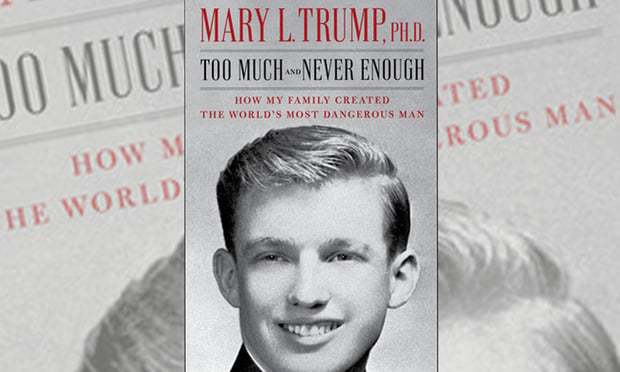On Eve of Publication, Upstate NY Judge Denies Bid to Block Book on President Donald Trump's Family
Robert Trump failed to meet the burden of demonstrating "imminent, irreparable harm to him," Dutchess County Supreme Court Justice Hal Greenwald found, using bold type to emphasize the final two words.
July 13, 2020 at 08:43 PM
4 minute read
 "" how="" my="" family="" created="" the="" most="" dangerous="" width="620" height="372" /> The cover of Mary Trump's "Too Much and Never Enough: How My Family Created the World's Most Dangerous Man."
"" how="" my="" family="" created="" the="" most="" dangerous="" width="620" height="372" /> The cover of Mary Trump's "Too Much and Never Enough: How My Family Created the World's Most Dangerous Man."
A Dutchess County Supreme Court justice on Monday denied President Donald Trump's brother's attempt to obtain a preliminary injunction against the brothers' niece, Mary Trump, whose book about the president is set for publication Tuesday, and her publisher Simon & Schuster.
Mary Trump signed a confidentiality agreement in connection with the settlement of her grandfather's will in 2001, but the family's circumstances and particularly those of her uncle Donald Trump have changed tremendously since then, Justice Hal Greenwald found.
"It is proclaimed, the enjoining of the publication of the Book is classic 'prior restraint' and cannot be tolerated," Greenwald wrote. "The Book is characterized as 'political speech.'"
Simon & Schuster attorney Elizabeth McNamara, a partner at Davis Wright Tremaine, described the ruling as an important win for Simon & Schuster, Mary Trump and the First Amendment.
Robert Trump's attorney, Charles Harder, had said that the lawsuit had "nothing to do with the First Amendment," arguing that it involved a private dispute about the will settlement. Under the confidentiality provision, Mary Trump said she would not publish information about her relationship with the president, Robert Trump or their sister, former Judge Maryanne Trump Barry of the U.S. Court of Appeals for the Third Circuit, without their consent, Harder argued.
"[I]n the vernacular of First year law students, "Con. Law trumps Contracts," Greenwald wrote in Monday's decision.
Greenwald vacated the temporary restraining order he previously granted against Mary Trump; Presiding Justice Alan Scheinkman of the New York Supreme Court, Appellate Division, Second Department previously lifted his TRO against Simon & Schuster but upheld it as to Mary Trump and any agent of hers.
Robert Trump failed to meet the burden of demonstrating "imminent, irreparable harm to him," Greenwald found, using bold type to emphasize the final two words.
"Remember the Plaintiff is Robert S. Trump and no one else," Greenwald wrote.
Greenwald also noted that the widespread distribution of the book by the time of his ruling meant that an attempted recall would involve "potential enormous cost and [a] logistical nightmare."
Scheinkman suggested that the court consider whether the confidentiality provision was "temporally and geographically reasonable," Greenwald wrote, observing that the Trumps' family circumstances have changed significantly since the agreement was signed in 2001.
"Remember, at the time the Agreement was agreed upon, the Trump family were New York based real estate developers and not much else," Greenwald wrote. "They were not elected officials or TV personalities. The issues that were the subject of the Agreement were intra family issues, not of worldwide concern, or even national interest."
Had the agreement included limits on time and place, it might be "more readily defensible," Greenwald explained.
Gibson, Dunn & Crutcher partner Theodore Boutrous Jr., who is representing Mary Trump, praised the ruling in a statement.
"The court got it right in rejecting the Trump family's effort to squelch Mary Trump's core political speech on important issues of public concern," he said. "The First Amendment forbids prior restraints because they are intolerable infringements on the right to participate in democracy. Tomorrow, the American public will be able to read Mary's important words for themselves."
READ MORE:
NY Appeals Court Keeps Block Against Mary Trump in Book Fight, But Lifts It for Her Publisher
Trump Sibling Seeks Order to Block Publication of Niece's Book About President
First Amendment Advocates Protest 'Extraordinary' Order Blocking Publication of Mary Trump's Book
This content has been archived. It is available through our partners, LexisNexis® and Bloomberg Law.
To view this content, please continue to their sites.
Not a Lexis Subscriber?
Subscribe Now
Not a Bloomberg Law Subscriber?
Subscribe Now
NOT FOR REPRINT
© 2025 ALM Global, LLC, All Rights Reserved. Request academic re-use from www.copyright.com. All other uses, submit a request to [email protected]. For more information visit Asset & Logo Licensing.
You Might Like
View All

'Serious Legal Errors'?: Rival League May Appeal Following Dismissal of Soccer Antitrust Case
6 minute read
'It's a Matter of Life and Death:' Ailing Harvey Weinstein Urges Judge to Move Up Retrial

Spotify GC Steps Down, Opts to 'Step Away From Full-Time Corporate Life'
2 minute readLaw Firms Mentioned
Trending Stories
- 1ACC CLO Survey Waves Warning Flags for Boards
- 2States Accuse Trump of Thwarting Court's Funding Restoration Order
- 3Microsoft Becomes Latest Tech Company to Face Claims of Stealing Marketing Commissions From Influencers
- 4Coral Gables Attorney Busted for Stalking Lawyer
- 5Trump's DOJ Delays Releasing Jan. 6 FBI Agents List Under Consent Order
Who Got The Work
J. Brugh Lower of Gibbons has entered an appearance for industrial equipment supplier Devco Corporation in a pending trademark infringement lawsuit. The suit, accusing the defendant of selling knock-off Graco products, was filed Dec. 18 in New Jersey District Court by Rivkin Radler on behalf of Graco Inc. and Graco Minnesota. The case, assigned to U.S. District Judge Zahid N. Quraishi, is 3:24-cv-11294, Graco Inc. et al v. Devco Corporation.
Who Got The Work
Rebecca Maller-Stein and Kent A. Yalowitz of Arnold & Porter Kaye Scholer have entered their appearances for Hanaco Venture Capital and its executives, Lior Prosor and David Frankel, in a pending securities lawsuit. The action, filed on Dec. 24 in New York Southern District Court by Zell, Aron & Co. on behalf of Goldeneye Advisors, accuses the defendants of negligently and fraudulently managing the plaintiff's $1 million investment. The case, assigned to U.S. District Judge Vernon S. Broderick, is 1:24-cv-09918, Goldeneye Advisors, LLC v. Hanaco Venture Capital, Ltd. et al.
Who Got The Work
Attorneys from A&O Shearman has stepped in as defense counsel for Toronto-Dominion Bank and other defendants in a pending securities class action. The suit, filed Dec. 11 in New York Southern District Court by Bleichmar Fonti & Auld, accuses the defendants of concealing the bank's 'pervasive' deficiencies in regards to its compliance with the Bank Secrecy Act and the quality of its anti-money laundering controls. The case, assigned to U.S. District Judge Arun Subramanian, is 1:24-cv-09445, Gonzalez v. The Toronto-Dominion Bank et al.
Who Got The Work
Crown Castle International, a Pennsylvania company providing shared communications infrastructure, has turned to Luke D. Wolf of Gordon Rees Scully Mansukhani to fend off a pending breach-of-contract lawsuit. The court action, filed Nov. 25 in Michigan Eastern District Court by Hooper Hathaway PC on behalf of The Town Residences LLC, accuses Crown Castle of failing to transfer approximately $30,000 in utility payments from T-Mobile in breach of a roof-top lease and assignment agreement. The case, assigned to U.S. District Judge Susan K. Declercq, is 2:24-cv-13131, The Town Residences LLC v. T-Mobile US, Inc. et al.
Who Got The Work
Wilfred P. Coronato and Daniel M. Schwartz of McCarter & English have stepped in as defense counsel to Electrolux Home Products Inc. in a pending product liability lawsuit. The court action, filed Nov. 26 in New York Eastern District Court by Poulos Lopiccolo PC and Nagel Rice LLP on behalf of David Stern, alleges that the defendant's refrigerators’ drawers and shelving repeatedly break and fall apart within months after purchase. The case, assigned to U.S. District Judge Joan M. Azrack, is 2:24-cv-08204, Stern v. Electrolux Home Products, Inc.
Featured Firms
Law Offices of Gary Martin Hays & Associates, P.C.
(470) 294-1674
Law Offices of Mark E. Salomone
(857) 444-6468
Smith & Hassler
(713) 739-1250






